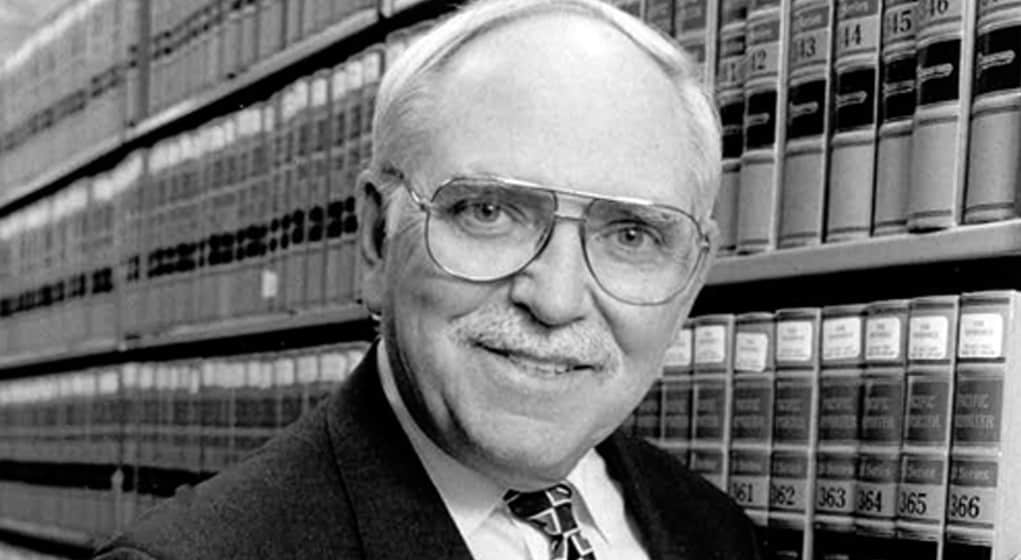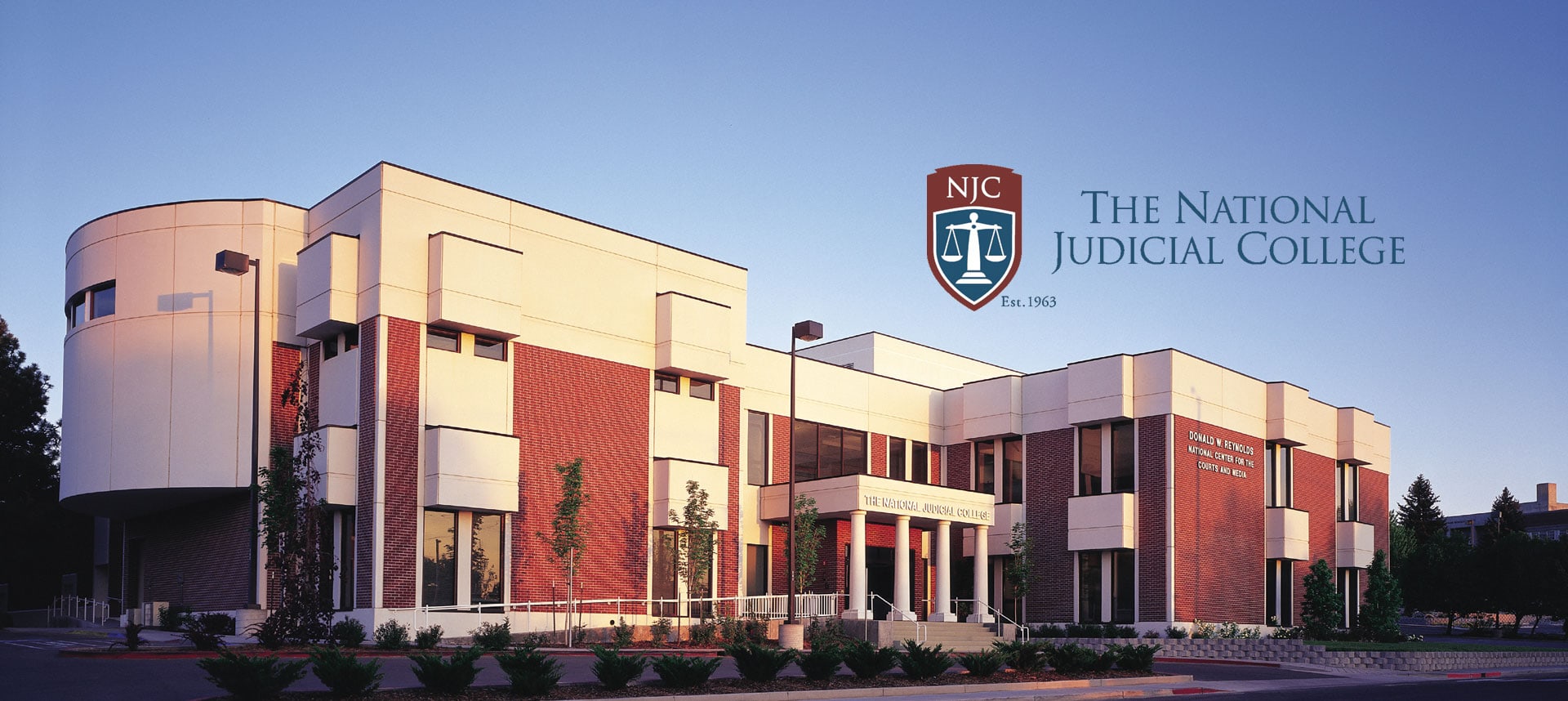

Judge V. Robert Payant, who joined the faculty in 1973, didn’t stop teaching until 2008, and served as chief executive officer of the College from 1990 until he retired in 1999, passed away on Tuesday, Sept. 4, at his home in Milwaukee. He was 86 and had been dealing with Parkinson’s disease in recent years.
Although he was the College’s seventh president (the title was dean and chief executive officer until 1994), his long tenure represented a quarter of the NJC’s history at the time he retired. He also served as associate dean from 1983 to 1985.
Judge Payant was instrumental in securing a $4 million grant from the Donald W. Reynolds Foundation and a matching allocation from the Nevada legislature that paid for the addition to the NJC’s headquarters on the University of Nevada, Reno campus. The new front section, which included a model courtroom, essentially doubled the facility’s size. The Reynolds grant also established the Reynolds National Center for Courts & Media.
In 1998, the College’s annual award for teaching excellence, established a decade earlier, was renamed in his honor – and given to him. The V. Robert Payant Award continues to be awarded each year to outstanding faculty who have taught for the College for at least 15 years.
Judge Payant taught – unpaid – in more than 100 different courses for the College. That included more than 30 occasions after he had retired as president. The subjects included evidence, search and seizure, sentencing, criminal law, decision making, victim’s rights, trial management, ethics, administrative law. He taught in the College’s flagship General Jurisdiction course – formerly offered three times a year, now twice – more than 50 times.
In his later years, he was especially active in the NJC’s international courses and taught students from Russia, Kazakhstan, Kyrgyzstan, Turkmenistan, Tajikistan, Ukraine, Armenia, Macedonia, Bulgaria, China, Colombia, the Palestinian Authority, Poland and Jordan.
He was admired for his lifelong dedication to the judiciary, and at the NJC he found a home among people who shared his passion for judicial excellence.
“He used to say that if you read the newspaper you might come away thinking there’s not a single reasonable judge left in the world,” said his wife of 62 years, Virginia Payant. “They were all there at the College. The people who came to the College were the ones who wanted to make the system work better, and that was always inspirational.”
Vital Robert Payant was born June 25, 1932, in the town of Iron Mountain on Michigan’s Upper Peninsula. His first name, pronounced VEE-tăl, of French origin, was the same as his father’s.
He was valedictorian of his high school class and also excelled in football and debate. A devoted Catholic, he earned both his bachelor’s (English literature) and law degree from Jesuit Marquette University in Milwaukee. In college he continued to participate in debate and was also active in drama.
“He had a great speaking voice and used it to good effect when he taught,” recalled William Brunson, the NJC’s director of special projects.
He was appointed a probate and juvenile court judge in Iron Mountain in 1963 and went on to serve at all levels of Michigan’s trial court system.
After a decade of teaching occasionally at the NJC, he resigned from the Michigan judiciary in 1983 to become the College’s associate dean. Two years later, he left Reno and served for three years as Michigan’s state court administrator before being lured back as dean and CEO.
Friends and colleagues from the NJC remember him as the consummate gentleman. He was dignified but also soft-spoken, kind and compassionate.
William Dressel, the NJC’s president from 2000 to 2013, had known him since the late 1970s. He said the Payants, Bob and Virginia, served the College as a team and always went out of their way to make people feel welcome.
“That came partly from his personality, but he was also a judge in a smaller area, and when I think of judges from these smaller rural areas, they are very committed to their community and very service oriented. That was Bob. He brought dignity to the judiciary in his area. He made them really proud that he served them, and he brought those same qualities to the NJC.”
Current NJC Chief Financial Officer Patrick Grimes, who in the 1990s was a young accountant working as an outside auditor for the College, remembers the president going out of his way to introduce him to judges. “He was an awesome person.”
Dressel said his predecessor believed strongly that the College should be about more than formal education. It should be a second home where judges could bounce ideas off of one another. That philosophy remains a core element of the NJC experience to this day.
During Payant and Dressel’s time, the College offered longer courses (General Jurisdiction was four weeks), and there were more opportunities to socialize. Often these happened at the Payant home. At casual get-togethers, he and Virginia were known to break out in song, sometimes accompanied by friend Joseph Weisberg, chief justice of the Rhode Island Supreme Court. Weisberg died in 2012.
“Bob and Virginia were delightful to watch,” recalled Ron Hofer, an NJC distinguished professor who specializes in teaching writing. “They were absolute lovebirds and just doted upon one another.”
Joseph Sawyer, director of online learning and faculty development for the College, remembers a time the president revived his college drama skills. He played Clarence Darrow in a one-man show for a three-night run for course participants, staff and members of the Reno community.
The College’s longest-tenured current staff member said, “He nailed Mr. Darrow with wit and humility.”
Hofer, the writing expert, described Judge Payant’s speaking style as “thoughtful and measured.” And that seemed to reflect his instincts as a manager. Like many children of the Depression, he was careful with money and committed to leading the College in a fiscally responsible manner.
Twice he was considered for the deanship and the job went to other candidates. The third invitation to interview came after he had returned to Michigan as state judicial educator. Virginia Payant thought her husband should decline. “But it’s a wonderful place,” she remembers him saying. So he gave it one more shot.
Dressel said his friend’s conservative nature – rumor had it that he was turned down the first two times because he thought the College was fine as it was – gradually gave way to a realization that the roles of judges were changing and the NJC needed to change, too.
“The best example was the drug courts and the veterans courts,” Dressel said. “Some said, ‘That’s not being a judge, that’s social work.’ Bob slowly looked at what the college was doing and who it was serving, and he could see that it had to be changed … we had to evolve.”
After he retired, the trustees honored Judge Payant with the title president emeritus, and he and Virginia remained in Reno. When the Catholic Church assigned Nevada a second bishop, he helped create the Nevada Catholic Conference and served as its first director. Among other activities, he lobbied the state government, unsuccessfully, for abolition of the death penalty.
And he continued to teach for the NJC, well into his 70s.
One day in 2008, he informed staff that it was time to stop. He was having difficulty remembering details for his lectures. He thought the College would be better served with somebody else.
His gave his last lectures during a 10-week course for judges from Jordan, who took what they learned at the NJC back to their country to teach their fellow judges.
This obituary from a Milwaukee funeral home handling the arrangements contains more details on Judge Payant, his family, a memorial Mass in Milwaukee and burial in Iron Mountain.
Friends wishing to honor his memory can contribute to the Honorable V. Robert Payant Endowment, which provides scholarships for judges and supports programming at the NJC.
Remembering the judge from Iron Mountain
“Judge Payant started his judicial career in Iron Mountain, Dickinson County, in Michigan’s Upper Peninsula, where he is remembered today as one of our most widely respected judges. He went on to judicial leadership roles in the state of Michigan, then nationally and internationally with The National Judicial College, but he will always be remembered here in the U.P. of Michigan as one of our best.”
Judge Thomas L. Solka
Marquette, MI“He was a very kind man who was passionate about judicial education and administration. He was a leader who people wanted to follow. I remember when my father passed away while Bob was the state court administrator, he sent me a little note. He did not have to do that, but he did.”
Judge William G. Kelly
Kentwood, MI“I have fond memories of classes with Judge Payant. As a new judge, I was confused about handling contempt of court proceedings until Judge Payant’s lecture on the subject. What I learned from him lasted me a whole career and gave me confidence where I had always needed it. Rest in Peace, Judge Payant.”
Judge Jess Clanton
Langley, OK“What a fine man. I very much enjoyed his company. NJC was enriched by his stewardship. Rest In Peace.”
Judge Steve Evans
Las Vegas“When I was academic director of the NJC, we had many professional disagreements about running the College, but I always respected him. His vision of international work for the NJC led me to my international career. I will always be grateful to him.”
Mary Frances Edwards, rule-of-law consultant (retired)
Sligo, Ireland“He just wanted that whatever was done to be done to the highest standards and be the very best. He left a legacy of many years of service and working, and after he retired, if there was something we needed, if we had a group of international visitors to address, he would be there with a smile on his face. You could just feel the warmth of a caring individual.”
President Emeritus William Dressel
Kauai, Hawaii“When I became president, Bob sent me a congratulatory letter. It was handwritten in a shaky script. It was very meaningful to me. I have kept it. He was a great gentleman who dedicated himself to something worthy and precious and larger than himself: justice. We cherish his memory and celebrate his example.”
President Benes Z. Aldana
National Judicial College

The Hon. Mary-Margaret Anderson (Ret.), a retired administrative law judge with the California Office of Ad...

Happy October, Gaveliers faithful. Are you loving this or what? No one believed a team made up of judges...


Hon. Diane J. Humetewa, the first Native American woman and the first enrolled tribal member to serve as a ...

Retired Massachusetts Chief Justice Margaret H. Marshall has been selected as the 2024 winner of the presti...